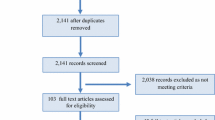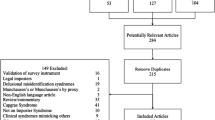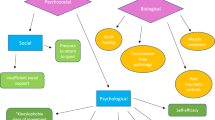Abstract
Research has accumulated to suggest that perceived injustice is a risk factor for poor recovery outcomes in individuals with whiplash injuries. The present study examined the relative contributions of treatment-related reductions in perceived injustice and pain severity, in the prediction of reductions in posttraumatic stress symptoms in individuals with whiplash injury. The study sample consisted of 146 individuals (66 women, 80 men) who sustained whiplash injuries in motor vehicle collisions and were enrolled in a multidisciplinary rehabilitation program designed to promote functional recovery following whiplash injury. Participants completed measures of pain severity, disability, posttraumatic stress symptoms, and perceived injustice prior to treatment and after treatment. Pearson correlations revealed that all study variables were significantly correlated. Regression analyses revealed that, at the time of enrollment in the intervention, perceived injustice accounted for a significant proportion of the variance in posttraumatic stress symptom severity, beyond the variance accounted for by pain severity. Paired sample t-tests revealed significant reductions in perceived injustice, pain severity, and posttraumatic stress symptom severity through the course of treatment. For individuals who scored above clinical threshold on a measure of posttraumatic stress symptoms at the time of enrollment in the intervention (N = 71), regression analyses revealed that reductions in perceived injustice accounted for a significant proportion of the variance in reduction of posttraumatic stress symptoms, beyond the variance accounted for by reduced pain severity. Clinical and theoretical implications of the present findings are discussed.
Similar content being viewed by others
References
American Psychiatric Association (2013). Diagnostic and statistical manual of mental disorders (5th ed.). Washington, DC.
Andersen, T. E., Brink, O., & Elklit, A. (2013). PTSD symptoms mediate the effect of attachment on pain and somatisation after whiplash injury. Clinical Practice and Epidemiology in Mental Health, 9, 75–83.
Andersen, T. E., Karstoft, K. I., Brink, O., & Elklit, A. (2016). Pain-catastrophizing and fear-avoidance beliefs as mediators between post-traumatic stress symptoms and pain following whiplash injury—A prospective cohort study. European Journal of Pain, 20(8), 1241–1252.
Asmundson, G. J., Coons, M. J., Taylor, S., & Katz, J. (2002). PTSD and the experience of pain: Research and clinical implications of shared vulnerability and mutual maintenance models. Canadian Journal of Psychiatry, 47, 930–937.
Beck, J. G., Grant, D. M., Read, J. P., Clapp, J. D., Coffey, S. F., Miller, L. M., & Palyo, S. A. (2008). The impact of event scale-revised: Psychometric properties in a sample of motor vehicle accident survivors. Journal of Anxiety Disorders, 22(2), 187–198.
Bomyea, J., Risbrough, V., & Lang, A. J. (2012). A consideration of select pre-trauma factors as key vulnerabilities in PTSD. Clinical Psychology Review, 32(7), 630–641.
Brunet, A., St-Hilaire, A., Jehel, L., & King, S. (2003). Validation of the French version of the Impact of Event Scale-Revised. Canadian Journal of Psychiatry, 48(1), 56–61.
Carroll, L. J., Holm, L. W., Hogg-Johnson, S., Côté, P., Cassidy, D., Haldeman, S., et al. (2008). Course and prognostic factors for neck pain in whiplash-associated disorders (WAD) results of the Bone and Joint Decade 2000-2010 Task Force on neck pain and its associated disorders. European Spine Journal, 17(1), 83–92.
Clayton, S. D. (2005). The experience of injustice: Some characteristics and correlates. Social Justice Research., 5(1), 71–91.
Creamer, M., Bell, R., & Failla, S. (2003). Psychometric properties of the Impact of Event Scale-Revised. Behaviour Research and Therapy, 41(12), 1489–1496.
D’Souza, R. F., & Rodrigo, A. (2004). Spiritually augmented cognitive behavioural therapy. Australians Psychiatry, 12(2), 148–152.
Darley, J. M., & Pitman, T. S. (2003). The psychology of compensatory and retributive justice. Personality and Social Psychology Review, 7(4), 324–336.
Deffenbacher, J. L. (2011). Cognitive-behavioral conceptualization and treatment of anger. Cognitive and Behavioral Practice, 18(2), 212–221.
Dunmore, E., Clark, D. M., & Ehlers, A. (2001). A prospective investigation of the role of cognitive factors in persistent posttraumatic stress disorder (PTSD) after physical or sexual assault. Behaviour Research and Therapy, 39(9), 1063–1084.
Ehlers, A., & Clark, D. M. (2000). A cognitive model of posttraumatic stress disorder. Behaviour Research and Therapy, 38(4), 319–345.
Ehlers, A., Mayou, R. A., & Bryant, B. (1998). Psychological predictors of chronic post-traumatic stress disorder after motor vehicle accidents. Journal of Abnormal Psychology, 107(3), 508–519.
Ezenwa, M. O., Molokie, R. E., Wilkie, D. J., Suarez, M. L., & Yao, Y. (2014). Perceived injustice predicts stress and pain in adults with sickle cell disease. Pain Management Nursing, 16(3), 294–306.
Ferrari, R., & Russell, A. S. (2014). Perceived injustice in fibromyalgia and rheumatoid arthritis. Clinical Rheumatology., 33(10), 1501–1507.
Graham, J. E., Lobel, M., Glass, P., & Lokshina, I. (2008). Effects of written anger expression in chronic pain patients: Making meaning from pain. Journal of Behavioral Medicine, 31(3), 201–212.
Gun, R. T., & Osti, O. L. (2005). Risk factors for prolonged disability after whiplash injury: A prospective study. Spine, 3(4), 386–391.
Hayes, S. C., Luoma, J. B., Bond, F. W., Masuda, A., & Lillis, J. (2006). Acceptance and commitment therapy: Model, processes and outcomes. Behaviour Research and Therapy, 44(1), 1–25.
Hickling, E. J., Blanchard, E. B., Buckley, T. C., & Taylor, A. E. (1999). Effects of attribution of responsibility for motor vehicle accidents on severity of PTSD symptoms, ways of coping, and recovery over six months. Journal of Traumatic Stress, 12(2), 345–353.
Keefe, F. J., Lefebvre, J. C., Egert, J. R., Affleck, G., Sullivan, M. J. L., & Caldwell, D. S. (2000). The relationship of gender to pain, pain behavior, and disability in osteoarthritis patients: The role of catastrophizing. Pain, 87(3), 325–334.
Kongsted, A., Bendix, T., Querama, E., Kasch, H., Bach, F. W., Korsholm, L., & Jensen, T. S. (2008). Acute stress response and recovery after whiplash injuries. A one-year prospective study. European Journal of Pain, 12(4), 455–463.
Lancaster, C. L., Teeters, J. B., Gros, D. F., & Back, S. E. (2016). Posttraumatic stress disorder: Overview of evidence-based assessment and treatment. Journal of Clinical Medicine, 5(11), 105.
Lerner, M. J. (1977). Justice motive—Some hypotheses as to its origins and forms. Journal of Personality, 45(1), 3–52.
Lind, E. A., & Tyler, T. R. (1988). The social psychology of procedural justice. New York: Plenum.
McCracken, L. M., & Eccleston, C. (2003). Coping or acceptance: What to do about chronic pain? Pain, 105(1–2), 197–204.
Melzack, R. (1975). The McGill Pain Questionnaire: Major properties and scoring methods. Pain, 1(3), 277–299.
Mikula, G., Scherer, K. R., & Athenstaedt, U. (1998). The role of injustice in the elicitation of differential emotional reactions. Personality and Social Psychology Bulletin, 24(7), 769–783.
Miller, D. T. (2001). Disrespect and the experience of injustice. Annual Review of Psychology, 52, 527–553.
Motor Accidents Authority (2001). Guidelines for the management of whiplash-associated disorders. Retrieved from http://www.whiplashprevention.org/SiteCollectionDocuments/Resea rch%20Arti c l es/Medical%20-%20Whiplash/GuidelinesDiagnosingWhiplash.pdf.
Panahi, Y., Moghaddam, B. R., Sahebkar, A., Nazari, M. A., Beiraghdar, F., Karami, G., & Saadat, A. R. (2011). A randomized, double-blind, placebo-controlled trial on the efficacy and tolerability of sertraline in Iranian veterans with post-traumatic stress disorder. Psychological Medicine, 41(10), 2159–2166.
Powers, M. B., Halpern, J. M., Ferenschak, M. P., Gillihan, S. J., & Foa, E. B. (2010). A meta-analytic review of prolonged exposure for posttraumatic stress disorder. Clinical Psychology Review, 30(6), 635–641.
Resick, P. A., & Schnicke, M. K. (1993). Cognitive processing therapy for rape victims: A treatment manual. Newbury Park: Sage.
Riddle, D., & Stratford, P. (1998). Use of generic versus region-specific functional status measures on patients with cervical spine disorders. Physical Therapy, 78(9), 951–963.
Ritchie, C., Ehrlich, C., & Sterling, M. (2017). Living with ongoing whiplash associated disorders: A qualitative study of individual perceptions and experiences. BMC Musculoskeletal Disorders, 18(1), 531.
Rodero, B., Luciano, J. V., Montero-Marin, J., Casanueva, B., Palacin, J. C., Gili, M., et al. (2012). Perceived injustice in fibromyalgia: Psychometric characteristics of the Injustice Experience Questionnaire and relationship with pain catastrophising and pain acceptance. Journal of Psychosomatic Research, 73(2), 86–91.
Scott, W., & Sullivan, M. (2012). Perceived injustice moderates the relationship between pain and depressive symptoms among individuals with persistent musculoskeletal pain. Pain Research and Management, 17(5), 335–340.
Scott, W., Trost, Z., Milioto, M., & Sullivan, M. J. (2015). Barriers to change in depressive symptoms after multidisciplinary rehabilitation for whiplash: The role of perceived injustice. Clinical Journal of Pain, 31(2), 145–151.
Scott, W., Trost, Z., Milioto, M., & Sullivan, M. J. L. (2013). Further validation of a measure of injury-related injustice perceptions to identify risk for occupational disability: A prospective study of individuals with whiplash injury. Journal of Occupational Rehabilitation, 23(4), 557–565.
Sharp, T. J., & Harvey, A. G. (2001). Chronic pain and posttraumatic stress disorder: Mutual maintenance? Clinical Psychology Review, 21, 857–877.
Spitzer, W. O., Skovron, M. L., Salmi, L. R., Cassidy, J. D., Duranceau, J., Suissa, S., & Zeiss, E. (1995). Scientific monograph of the Quebec Task Force on Whiplash-Associated Disorders: Redefining “whiplash” and its management. Spine, 20(8), 1S–73S.
Statistical Package for the Social Sciences. (2011). (SPSS, version 20 for Windows). Rel. 09.14. Armonk: IBM.
Sterling, M., Hendrikz, J., & Kenardy, F. (2010). Developmental trajectories of pain/disability and PTSD symptoms following whiplash injury. Pain, 150, 22–28.
Sullivan, M. J. L., Adams, H., Horan, S., Maher, D., Boland, D., & Gross, R. (2008). The role of perceived injustice in the experience of chronic pain and disability: Scale development and validation. Journal of Occupational Rehabilitation, 18(3), 249–261.
Sullivan, M. J. L., Thibault, P., Simmonds, M. J., Milioto, M., Cantin, A. P., & Velly, A. M. (2009). Pain, perceived injustice and the persistence of post-traumatic stress symptoms during the course of rehabilitation for whiplash injuries. Pain, 145(3), 325–331.
Tolin, D. F., & Foa, E. B. (2006). Sex differences in trauma and posttraumatic stress disorder: A quantitative review of 25 years of research. Psychological Bulletin, 132(6), 959–992.
Trost, Z., Scott, W., Buelow, M. T., Nowlin, L., Turan, B., Boals, A., & Monden, K. R. (2017). The association between injustice perception and psychological outcomes in an inpatient spinal cord injury sample: The mediating effects of anger. Spinal Cord, 55(10), 898–905.
Trost, Z., Scott, W., Lange, J. M., Manganelli, L., Bernier, E., & Sullivan, M. J. L. (2014). An experimental investigation of the effect of a justice violation on pain experience and expression among individuals with high and low just world beliefs. European Journal of Pain, 18(3), 415–423.
Turk, D. C., Rudy, T., & Salovey, P. (1985). The McGill Pain Questionnaire: Confirming the factor analysis and examining appropriate uses. Pain, 21(4), 385–397.
Veilleux, S., Sicard, D., & Bohuon, A. (1989). Traduction de McGill Pain Questionnaire. In R. Melzack & P. Wall (Eds.), Le defi de la douleur. (Troisieme edition. ed.). St-Hyacinthe: Edisem.
Vernon, H., & Mior, S. (1991). The neck disability index: A study of reliability and validity. Journal of Manipulative Physiological Therapeutics, 14(7), 409–415.
Walton, D. M., Pretty, J., MacDermid, J. C., & Teasell, R. W. (2009). Rick factors for persistent problems following whiplash injury: Results of a systematic review and meta-analysis. Journal of Orthopaedic & Sports Physical Therapy, 39(5), 334–350.
Weiss, D., & Marmar, C. (1997). The Impact of Events Scale-Revised. In J. Wilson & T. Keane (Eds.), Assessing psychological trauma and PTSD (pp. 399–411). New York: Guilford.
Wlodyla-Demaille, S., Poiraudeau, S., Catanzarini, J.-F., Rannou, F., Fermanian, J., & Revel, M. (2002). Translation and validation of 3 functional disability scales for neck pain. Archives of Physical Medicine and Rehabilitation, 83(3), 376–382.
Yakobov, E., Scott, W., Stanish, W., Dunbar, M., Richardson, G., & Sullivan, M. J. L. (2014). The role of perceived injustice in the prediction of pain and function following total knee arthroplasty. Pain, 155(10), 2040–2046.
Yakobov, E., Scott, W., Tanzer, M., Stanish, W., Dunbar, M., Richardson, G., & Sullivan, M. J. L. (2014). Validation of the injustice experiences questionnaire adapted for use with patients with severe osteoarthritis of the knee. Journal of Arthritis, 3(1), 130–136.
Yehuda, R. (2002). Post-traumatic stress disorder. The New England Journal of Medicine, 346, 108–114.
Funding
This research was supported by funds from the Canadian Institutes for Health Research.
Author information
Authors and Affiliations
Corresponding author
Ethics declarations
Conflict of Interest
The authors declare that they have no competing interests.
Rights and permissions
About this article
Cite this article
Yakobov, E., Sullivan, M.J.L. Reductions in Perceived Injustice Are Associated with Reductions in Posttraumatic Stress Symptoms Among Individuals Receiving Treatment for Whiplash Injury. Psychol. Inj. and Law 11, 256–264 (2018). https://doi.org/10.1007/s12207-018-9326-x
Received:
Accepted:
Published:
Issue Date:
DOI: https://doi.org/10.1007/s12207-018-9326-x




